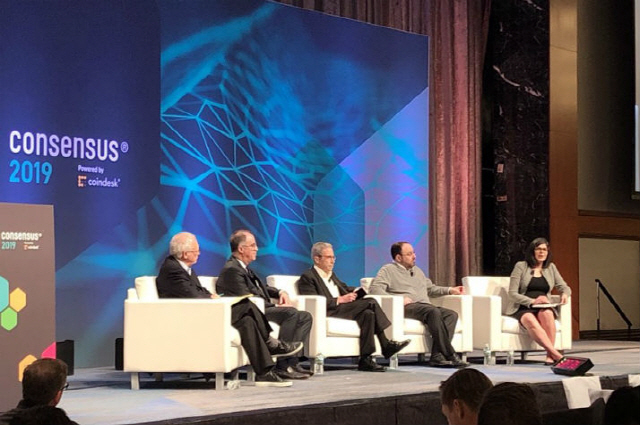
NEW YORK -- “Solid economic mechanism must be grafted onto technology to bring blockchain technology into the mainstream. Blockchain without mechanism will just remain as a technology enabling cuts in transaction costs and ensuring quality.”
In the “Consensus 2019” blockchain conference held in New York Monday, economics professors who had won Nobel prizes made these comments under the theme of “From Digital Gold to Contract Theory: the Economics of Mainstream Adoption” and discussed blockchain’s merits and demerits.
Mechanism key to determining virtuous circle in blockchain market
Prof. Eric Maskin of Harvard University who won the Nobel Prize in economics in 2007 for developing the theory of mechanism design said there must be enough competitors and mechanism designing processes to enable the (blockchain) market work properly. This means that to introduce quality services, it’s necessary to adopt a mechanism specific to the market rather than to rely on market forces. As an example of mechanism design, he cited the “Vickrey auction” scheme that had been used in the course of privatization like in government’s frequency band sales. The Vickrey auction scheme envisions letting an applicant bidding the highest price win the auction but allowing the winner to pay the second-highest price to prevent applicants from bidding too high prices and expect reasonable bidding results.
Prof. Joshua Gans of Toronto University concurred on Maskin’s logic. According to Gans, “there must be demand to make blockchain worthwhile and mechanism design should be crafted well to create demand. What needs to be weighed up first when such new technologies as blockchain comes out is how this technology minimizes the existing thing.” He added that one needs to build mechanism in consideration of the fact that blockchain can save costs for authentication and networking.
Numerous kinds of blockchain mechanism
What examples of blockchain mechanism are there indeed?
Prof. Oliver Hart of Harvard University who won the 2016 Nobel Prize for contributing to research into contract theory stressed that all economic relations are based on contract, saying that the key is to make transparency of contract processes revealed well and mutual agreement work properly and commitment is where blockchain can glitter best.
One can build a creative mechanism, capitalizing on different characteristics of blockchain. Prof. Maskin said both public and private blockchain platforms can be utilized in auctions, adding that “because everyone is sensitive to the other party’s awareness of my bidding price in auctions, my bidding price can be concealed through private blockchain but what needs to be verified can be built on public blockchain.”
‘Cryptocurrency is certainly not currency’
The emergence of cryptocurrency served as an occasion to redefine money. Prof. David Yermack of New York University Stern School of Business said that the appearance of cryptocurrency prompted economists to redefine money because it became possible to exchange value without passing through banks, noting that this is like asking a question about whether we have to pass through banks in transactions.
However, Prof. Yermack says cryptocurrency can’t play the role of currency. Explaining that money serves as a medium of exchange, as a store of value and as a unit of account, he said that Bitcoin is far from these functions. With regard to money’s function as a store of value, Prof. Yermack said that investors could recognize Bitcoin as a store of value, adding, however, that Bitcoin is too unstable to serve as a store of value.
Prof. Maskin expressed concern about cryptocurrency too. According to him, “cryptocurrency can impede some social functions. What’s at stake here is banks since transactions between individuals are possible. Yet banks have their own proper functions.” This means that banks can play certain roles like identifying which companies are promising through numerous services including lending. His position is that it might not be safe to build an ecosystem running counter to proper social functions although the assertion that banks will be unnecessary with the use of cryptocurrency boosting transactions is reasonable. /yjk@decenter.kr
- Janice Yunji Kim








![비트코인 8만 8000달러선…주요 알트코인도 하락세[디센터 시황]](https://newsimg.sedaily.com/2025/12/15/2H1QMJVFUE_2_s.png)
![서클, 엑셀라 개발사 인수에도 AXL 하락…왜? [알트코인 포커스]](https://newsimg.sedaily.com/2025/12/16/2H1R4FE9UE_5_s.jpg)



![[단독]네이버파이낸셜, 해시드와 ‘코인 지갑’ 내달 선보인다](https://newsimg.sedaily.com/2025/11/25/2H0LB3A07Q_11_s.jpg)
![[단독]금융위 “공동검사 요구 과도”…스테이블코인 놓고 한은과 파열음](https://newsimg.sedaily.com/2025/11/24/2H0KUTU6OA_5_s.png)
![[단독] '은둔의 경영자' 송치형, 네이버와 합병 청사진 직접 밝힌다](https://newsimg.sedaily.com/2025/11/21/2H0JI570IZ_5_s.jpeg)








